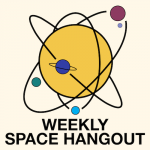Podcaster: Host : Fraser Cain; Guest: Dr. Jacob Izraelevitz, Dr. Sofia Z. Sheikh ,C.C. Petersen, Dr. Morgan Rehnberg,Dr. Leah Jenks

Title: Up, Up & Away with Dr. Jacob Izraelevitz and JPL’s Venus Aerial Robotic Balloons
Link: Cosmoquest: http://cosmoquest.org
Description:
Today’s story:
- Artemis, of course.
- IceCube neutrinos see an active galaxy.
- A picture of a protostar from JWST.
- The closest BH to Earth!
- The “History” Channel found a piece of the Challenger.
Host: Fraser Cain ( @fcain )
Special Guest: Despite the romance associated with Venus for millennia thanks to its having been named after the Roman god of love, Venus has proven to anything BUT romantic – LITERALLY! Combining the toxic and corrosive composition of its atmosphere with the crushing pressure exerted on anything that attempts to venture too far into it, Venus is the last place most of us would choose for a date. These conditions proved to be disastsrous for missions that sent traditional craft to the planet. To date, the only “craft” to have survived for more than a few hours are the 1985 Soviet Vega 1 () and Vega 2 (https://solarsystem.nasa.gov/missions/vega-1/in-depth/) balloon missions where each survived just over 46 hours before their batteries ran out. It would seem that baloons are the way to go!
This week we are joined by Dr. Jacob Izraelevitz, Principal Investigator of the JPL project that is developing robotic balloons — currently called aerobots — that will eventually (hopefully) lead to successful exploration of Venus. In July, 2022, a one-third scale prototype aerobot successfully completed two test flights and achieved controlled flight at more than 4000 feet. These flights were coordinated by Coordinated by Near Space Corporation (https://nsc.aero/), a commercial provider of high altitude/near space platforms and flight services.
You can read all about this exciting project in this article written by WSH and Universe Today alumnus Ian O’Neill: https://www.jpl.nasa.gov/news/jpls-venus-aerial-robotic-balloon-prototype-aces-test-flights
Dr. Jacob Izraelevitz is a Robotics Technologist and Group Lead at the NASA Jet Propulsion Laboratory in the Extreme Environment Robotics Group, and is the Principal Investigator of JPL’s Variable-Altitude Venus Aerobots development task.
His career at JPL has primarily sat at the interface of controls and fluid mechanics, covering both powered and buoyant aerial platforms for Venus and Mars. Jacob also acts in a systems engineering role for instrument accommodation on the Europa Lander.
Jacob received his Ph.D. and M.S. in Mechanical Engineering from the Massachusetts Institute of Technology in the aerodynamics of flapping wings, and B.S. in Mechanical Engineering from Olin College of Engineering.
To learn more about Jacob and stay up to date with his research, visit his JPL website (https://www-robotics.jpl.nasa.gov/who-we-are/people/jacob_izraelevitz/) or find him on LinkedIn (https://www.linkedin.com/in/jacob-izraelevitz-b250141a.
Dr. Sofia Z. Sheikh is a radio astronomer and astrobiologist working at the SETI Institute. She obtained her undergraduate degrees in physics and astronomy at UC Berkeley, and has recently returned to the Bay Area with an NSF-ASCEND Postdoctoral Fellowship after getting her PhD in Astronomy and Astrobiology at Penn State. Currently, she is performing SETI searches and studying pulsars and fast radio bursts with the Allen Telescope Array, a 42-dish radio array located in Hat Creek, California. Be sure to follow her on Twitter: @SETISheikh
You can learn more about the Allen Telescope Array (ATA) by visiting their website: https://www.seti.org/seti-allen-telescope-array-ata
Regular Guests:
- C.C. Petersen ( http://thespacewriter.com/wp/ & @AstroUniverse & @SpaceWriter )
- Dr. Morgan Rehnberg ( http://www.morganrehnberg.com/ & @MorganRehnberg )
- Dr. Leah Jenks ( https://leahjenks.com/ / @leahgjenks )
Today’s sponsor: Big thanks to our Patreon supporters this month: Rob Leeson, David Bowes, Brett Duane, Benett Bolek, Mary Ann, Frank Frankovic, Michael Freedman, Kim Hay, Steven Emert, Frank Tippin, Rani Bush, Jako Danar, Joseph J. Biernat, Nik Whitehead, Michael W, Cherry Wood, Steve Nerlich, Steven Kluth, James K Wood, Katrina Ince, Phyllis Foster, Don Swartwout, Barbara Geier, Steven Jansen, Donald Immerwahr
Please consider sponsoring a day or two. Just click on the “Donate” button on the lower left side of this webpage, or contact us at signup@365daysofastronomy.org.
Or please visit our Patreon page: https://www.patreon.com/365DaysOfAstronomy
End of podcast:
365 Days of Astronomy
=====================
The 365 Days of Astronomy Podcast is produced by Planetary Science Institute. Audio post-production by Richard Drumm. Bandwidth donated by libsyn.com and wizzard media. You may reproduce and distribute this audio for non-commercial purposes.
This show is made possible thanks to the generous donations of people like you! Please consider supporting to our show on Patreon.com/365DaysofAstronomy and get access to bonus content.
After 10 years, the 365 Days of Astronomy podcast is poised to enter its second decade of sharing important milestone in space exploration and astronomy discoveries. Join us and share your story. Until tomorrow! Goodbye!

